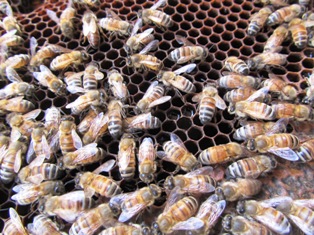Skunks Snacking on Bees, Who Knew?
I had to do some searching around the Internet to beekeeping sites to find out whether or not skunks eat bees. Apparently they do.
The way it works, a skunk comes around in the early evening after sundown and will scratch on a hive until the guard bee or bees come straight out and then swats at them before eating the bees. Mother skunks even teach this behavior to their young.
My beekeeper neighbor keeps his hives elevated onto a bottom board platform. One would think this should ensure that the skunks would not bother the hive, but there is evidence lately of a skunk coming around.
Some of the telltale signs that a skunk might be raiding your hives are scratch marks on the hive, muddy prints if there’s a water source nearby, skunk feces (some may have dead bees in it), and dead bees on the ground in front of the hive.
When marauding mammals like skunks and raccoons get a taste for bees, a hive can die. Some suggestions I found searching around on the Internet include putting down tack strips (like those used to install wall-to-wall carpets).
Another is to put a screen around the hives (with an opening at the top for the bees to come and go) or place chicken wire in front of the hives. Skunks like standing on solid footing, not wire or mesh. A roll of mesh at the base of the hive could also be an effective deterrent.
You definitely want to get rid of the skunks. One can decimate a hive in a single night scratching, eating, throwing dirt until the bees get angry and come out in mass and then the skunk has a big meal. The hive thus weakened can be empty within a day or so.
 Facebook
Facebook Goodreads
Goodreads LinkedIn
LinkedIn Meera Lester
Meera Lester Twitter
Twitter





